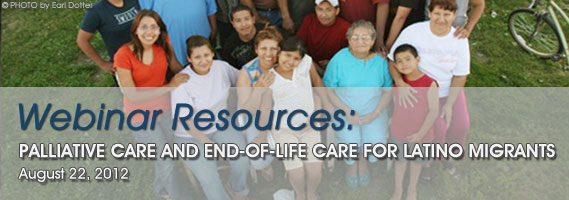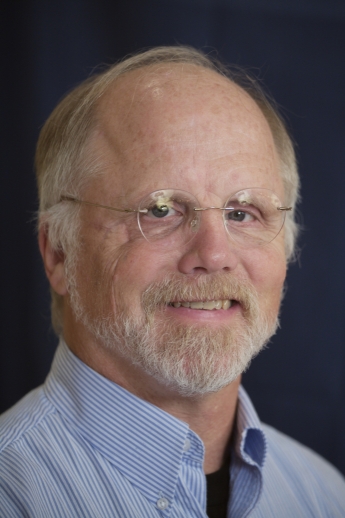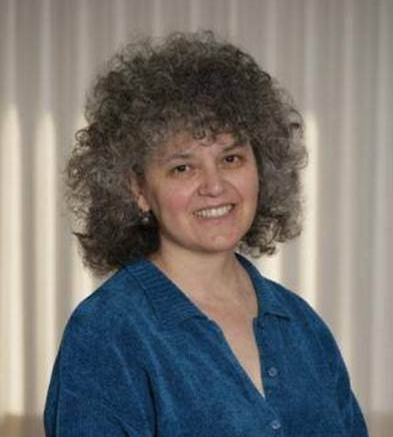- Who We Are
- Clinician Employment
- Publications
- Witness to Witness (W2W)
- El Premio Kugel & Zuroweste a la Justicia en la Salud
- Your Voice Matters: Photovoice Project

DATE RECORDED: Wednesday, August 22, 2012
TIME: 10:00am PST (Noon CST, 1:00pm EST)
PRESENTERS: Tina Castañares, MD and George Davis, MD
View the recorded webinar now
Additional Resources
Presentation Slides (PDF)
Participant Evaluation
DESCRIPTION:
Primary care clinicians working in migrant and community health centers are vital advocates for migrants and other marginalized people confronting chronic pain, death and dying. Primary care clinicians serving as the patient’s medical home are best suited to prognostication, as well as delivering grave news with art, compassion, and cultural proficiency. As patients with terminal illnesses advance in their disease and experience clinical decline, clinicians need to be skilled practitioners of palliative care and end-of-life symptom management, including prevention and effective control of pain.
This webinar will describe and define hospice, palliative care and ethical issues of autonomy in the context of culture. Critical in this discussion is a conversation about prognostication, communication, and symptom management. Taking into account the unique circumstances of the migrant population, this webinar will address the strengths and assets migrant and immigrant communities bring to the table around caregiving and end-of-life care. These assets include traditional family support systems, a culture of caring for one’s elders, spirituality and religious faith, and potential cultural values related to fatalism and resignación among many Latino migrants.
The webinar will highlight practical, real-life resources and tools that participants can use to improve palliative and hospice care in their practice settings. The presenters will share one hospice organization’s experience using the community health worker or promotor de salud model for needs assessment and outreach. This practice may be adapted as a model for other health centers to leverage resources and enhancement services.
SPONSORED BY: Migrant Clinicians Network
OBJECTIVES:
- Describe and define palliative and hospice care.
- Identify barriers to access to palliative and hospice care.
- Discuss approaches to pain and symptom management.
- Understand how autonomy, family dynamics, and culture impact decisions in end-of-life care.
- Share resources and practices available to community health centers for palliative and hospice care.
PRESENTER BIO:
Tina Castañares, MD | George Davis, MD |
|  George Davis, MD has worked in primary care in upstate New York since 1980. He has specialized in the care of the dying or end- of- life care since the mid 1990’s. He now runs a program that coaches patients, their families, or their doctors on palliative care. He has a Master’s degree in Bioethics. He has been involved in migrant health through these years and has served as Board chairman for MCN. |
CONTACT:
Jillian Hopewell, MPA, MA, Director of Education and Professional Development
(p) 530.345.4806 (e) jhopewell@@migrantclinician.org



 Tina Castañares worked for 30 years as a primary care clinician at three migrant health centers, 25 of those years at La Clínica del Cariño in Hood River and The Dalles, Oregon. In 2003, she also began working in end-of-life care, and until July, 2012 served as Medical Director for Hospice of The Gorge. Though now semi-retired, she continues to provide palliative care consultations in selected cases. Dr. Castañares has consulted with more than 60 federally qualified health centers as a technical assistant. She also has been involved in health care reform and grantmaking. She has taught and lectured nationally and internationally about resource allocation, Latino and immigrant health, palliative and end-of-life care, bioethics, and health care reform.
Tina Castañares worked for 30 years as a primary care clinician at three migrant health centers, 25 of those years at La Clínica del Cariño in Hood River and The Dalles, Oregon. In 2003, she also began working in end-of-life care, and until July, 2012 served as Medical Director for Hospice of The Gorge. Though now semi-retired, she continues to provide palliative care consultations in selected cases. Dr. Castañares has consulted with more than 60 federally qualified health centers as a technical assistant. She also has been involved in health care reform and grantmaking. She has taught and lectured nationally and internationally about resource allocation, Latino and immigrant health, palliative and end-of-life care, bioethics, and health care reform.
